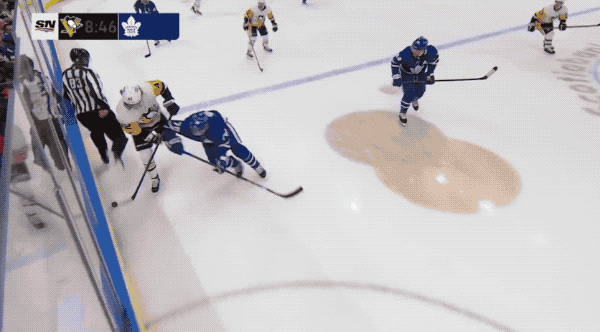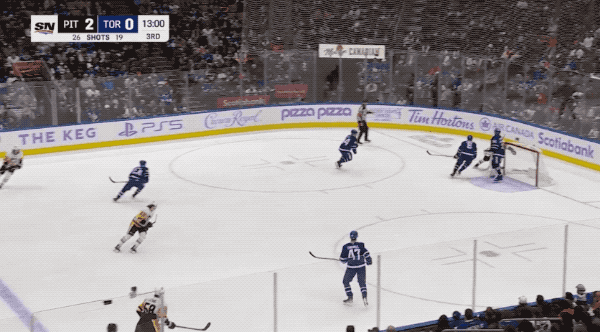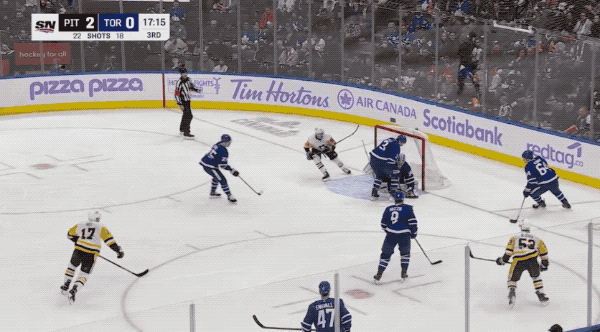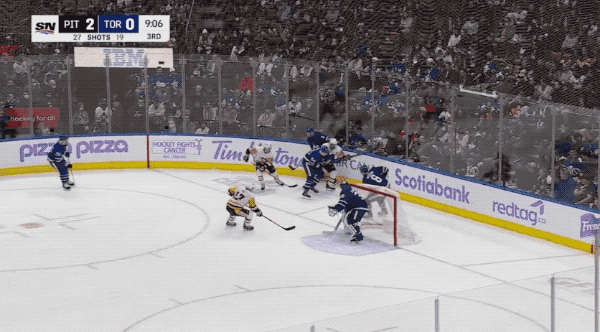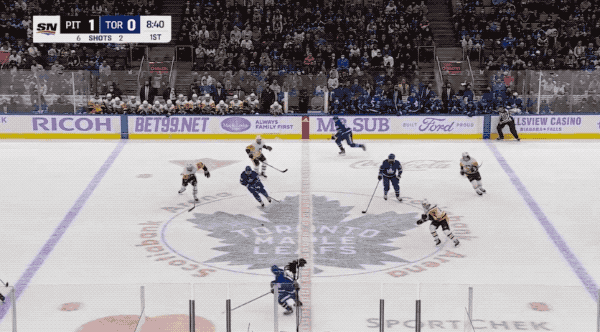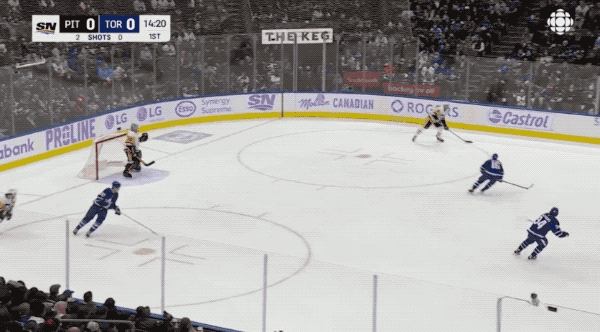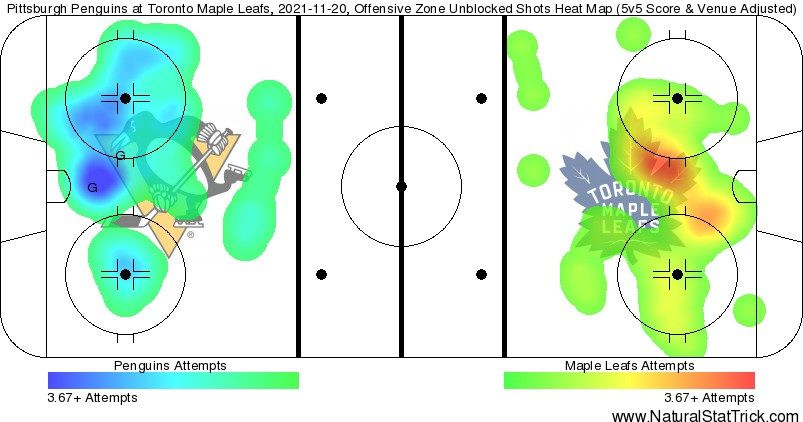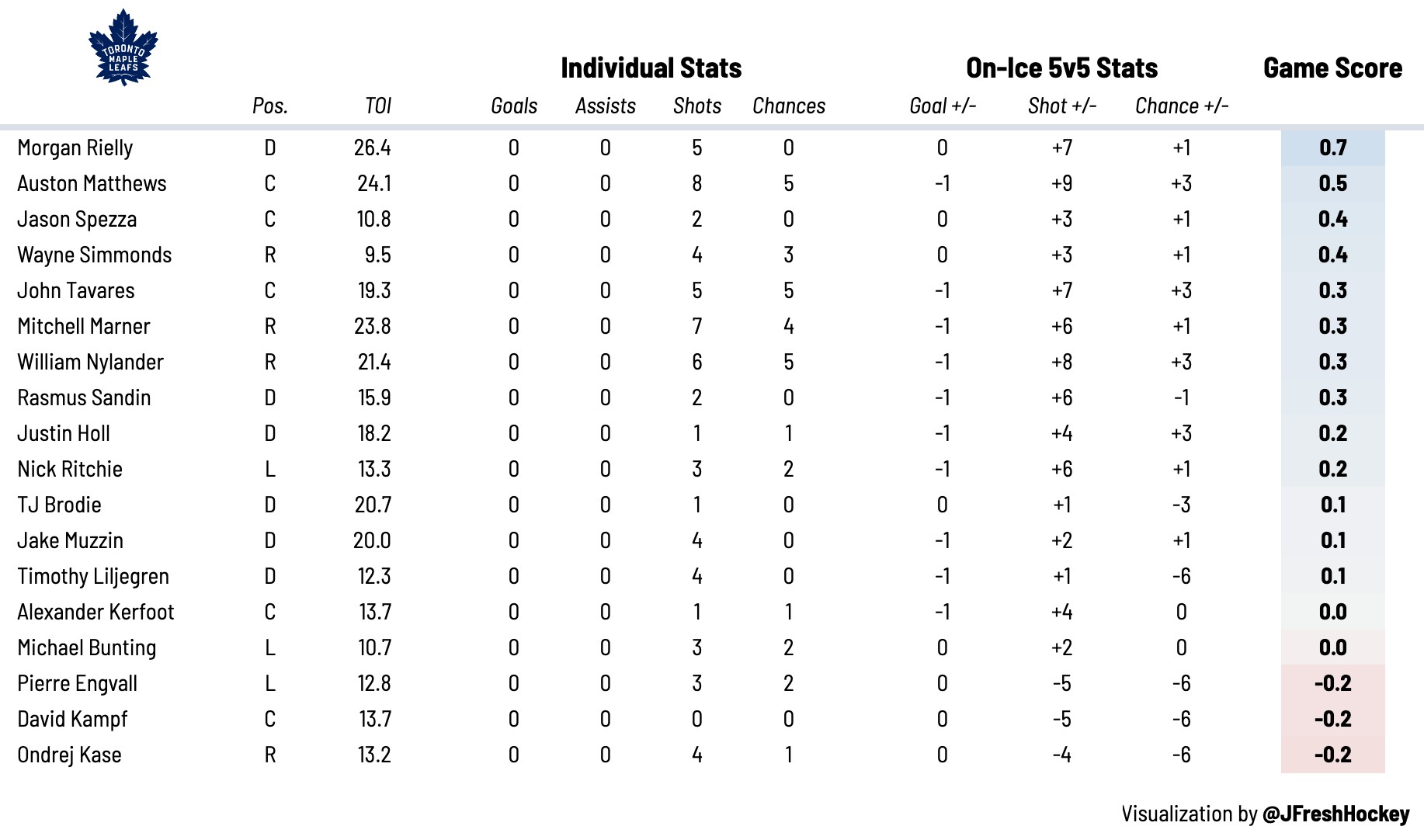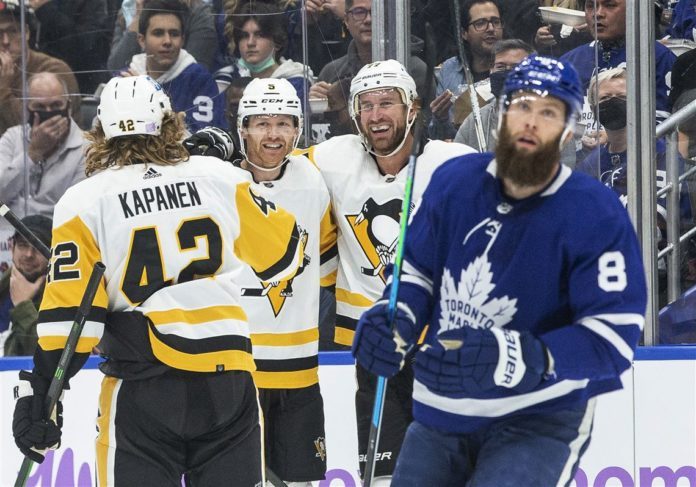
Will the Toronto Maple Leafs Ever Score Again?
Sorry, that’s my clickbaity headline.
Toronto lost to Pittsburgh 2-0 on Saturday night, which brings up a funny stat about the Leafs. They currently rank 28th in 5v5 goal scoring right now, which just does not compute if you’ve been following them closely this year. They rank first in scoring chances per Natural Stat Trick, but the pucks just aren’t going in.
To put it in laymen’s terms, this team has been shooting 9% at 5v5 since Matthews entered the NHL. This year? They’re at 6%. That’s going to regress (upwards) and the team is going to score more goals.
I feel the need to bring all of this up because dry nights of shooting percentage can make a hockey fan go crazy. I’m sure fans in this city just love hearing the excuse of a 2% shooting percentage costing you a series, but sometimes shooting luck can be a very real part of this sport.
The Leafs went through a bit more of it in this loss to the Penguins. The fact that Toronto has had such poor fortunes offensively and still managed to win 10 out of their previous 11 games speaks volumes to how everything else is going. The power play and penalty kill have been excellent of late. Jack Campbell is in the Vezina conversation. Even David Kampf is making a fan out of the doubters like me!
I’m weirdly feeling positive about the Leafs right now despite this recent loss. My apologies if the uplifting tone isn’t what you were in the mood for today. Nevertheless, it’s time for some Leafs Report Cards!
5 Stars
Michael Bunting (LW, #58) — A poor man’s Nazem Kadri. What an artistic display of penalty drawing. Michael Bunting does such a good job at battling hard for body position without the puck, pissing off his opponent in the process, and then magically falling down the second that player retaliates. It’s almost as if he’s done this before.
Michael Bunting has now drawn 11 penalties. Only Tampa's Anthony Cirelli has drawn more (13).
— luke fox (@lukefoxjukebox) November 21, 2021
I can’t wait to see his “energy” in a playoff series. He’s not a fun player to play against in those 50-50 battles.
Bunting also made some solid plays with the puck in this game, finding Wayne Simmonds in the slot for a Grade-A chance. Much like the rest of Simmonds’ chances this year, the puck didn’t go in, but I’m convinced his fortunes are bound to turn around soon. More on that later.
TJ Brodie (RD, #78) — I’d argue this was Brodie’s best game of the season. His gap looked excellent defensively, in that he was keeping the opposing forward within a stick-length every time they approached Toronto’s blue line off the rush. Brodie does such a great job of closing that gap in 1v1 situations when he’s on his A-game, which he certainly was tonight.
My favourite play of his was the following sequence, where he battles hard to win the puck back in the neutral zone, then makes a confident play with the puck up the ice.
These are the types of plays we haven’t seen as much from Brodie this season, but they’re somewhere in his tool bag. Historically, he’s always been an efficient puck-mover out of the defensive zone and into the offensive zone. Based on that long track record of above-average puck transporting, I’d expect us to see him make more positive plays up the ice.
Jack Campbell (G, #36) — Speaking of confidence, how locked in does Jack Campbell look these days? The first goal is one he’ll want back, so we’ll get that right out of the way, but the second goal was a backdoor pass to Jeff Carter where Campbell had no chance.
“Soupy” was perfect the rest of the way. He made a couple of big stops in tight on Jake Guentzel, got across for a toe save on Jason Zucker, and robbed Kasperi Kapanen on a one-timer coming off of a pass from below the goal line.
The goal support wasn’t there tonight, but you can’t ask for much more of Jack Campbell. He’s been spectacular to start the season.
4 Stars
The Third Line — I thought the Engvall-Kampf-Kase line looked great in this game at establishing positive momentum for the team with offensive-zone shifts, which is why I was so surprised to see that they’d been drastically outshot and out-chanced at 5v5. That’s not the norm for these three; they’ve been one of the best third lines in hockey when it comes to driving play at even strength.
Even after tonight’s game, they’re still controlling 60% percent of the expected goals this year according to Moneypuck.com’s model. That’s likely to continue, unlike their low on-ice shooting percentage. The goals are going to come for them at 5v5, especially if they keep making plays like these.
This play shows a lot of each player’s strengths:
- David Kampf’s ability to make high-percentage passes in the defensive zone
- Ondrej Kase making the structure-breaking play to create offense
- Pierre Engvall driving us all insane
Don’t worry, he drives his teammates nuts, too!
I feel bad clipping this because Engvall actually had a really strong game transitioning the puck from defense to offense. I have to show it, though, because it’s his poor decision-making that’s driving us all crazy. He has the physical tools to push play up the ice, but he can’t think the game at a top-six level.
This is such a weird combination of forwards, offensively. You have Kase, who’s always been a top-six point producer when healthy. You have Kampf, who’s scored at a below-replacement level. And you have Engvall, who’s historically produced at a third-line rate but looks weird while doing it.
I still think Kase is the engine that drives this bus, which was also the case tonight. That said, it can’t be understated how well Kampf has played defensively to the point that this $4 million collection of forwards is tilting the ice at a 60% expected goal rate despite less than favourable usage.
It’s been the biggest pleasant surprise of the season for my money.
The Cross Bar — I counted three times William Nylander rang one off the bar and once for Mitch Marner, so we’ll throw him in here, too. The way I see it, beating an NHL goaltender clean is a big deal. Posts and cross bars are one way we can measure that.
I care about the process leading to goals. For example, this backdoor pass by Marner is a fantastic play that we should appreciate:
What would you say are the odds of that going in? One in three? You’re right, that puck was never going in for Nick Ritchie, but my point is that it’s a high-value play. Whether or not the goal horn goes off is going to change the way we all think about that pass, but at the end of the day, I just want more quality chances like that.
I thought Marner did a solid job initiating offense with his passing, even despite the disaster that is Toronto’s 5v3 power play. At 5v4, he looked dangerous as a facilitator from the point when he swapped roles with Rielly.
When the players on this top unit start rotating into different spots, that’s when it becomes most unpredictable. It’s part of the reason I love Auston Matthews interchangeably playing the left or right wall. They’re not coming at you with a bread-and-butter approach; it’s free-flowing when it’s at its best and the motion confuses tired penalty killers.
Alex Kerfoot (LW, #15) — He’s made a couple of passes in transition lately that look like legitimate top-six passes. When Kerfoot was first traded to Toronto, I dove deep into his statistical profile, finding that his passing and puck-transporting were his two biggest strengths.
When he’s playing at his best, he’s using his speed to carry the puck up the ice and completing the next pass after he crosses the offensive blueline. It’s that last part that can be troublesome for him at times, but I thought he did well in that regard against Pittsburgh.
3 Stars
Justin Holl (RD, #3) — How long is Justin Holl going to need to carry Toronto’s shutdown pairing?
That’s just a joke, but Jake Muzzin did have another rough night on the back-end, which makes Holl’s life much more difficult, especially considering the forwards he’s going up against. With those factors being taken into account, I’d argue Holl held his own in this game, especially on the penalty kill.
Timothy Liljegren (RD, #37) — Much like Holl, Timothy Liljegren’s partner had a night. With that in mind, I thought Liljegren played a solid 200-foot game. He was closing out on his man in 1v1 situations, moving the puck quickly, and shooting the puck at the net a lot.
That’s my one criticism of him lately. He’s a bit shot-happy for a guy who isn’t a real shot threat. He’s a great passer, so I wish he’d look more for the next pass instead of firing low percentage wristers from the point. If he’s going to insist on taking those shots, it’d be nice if he shot more for the deflection, similar to how we’ve seen Sandin deliver slap-passes or hard wristers onto a teammate’s tape.
Spezza and Simmonds — I don’t have major praise and I don’t have any major criticisms. Wayne Simmonds just keeps getting good looks from the slot and goalies just keep stopping them. The dam is going to have to break eventually, so I’m not too worried about his lack of goals right now. Those will come if he keeps generating quality chances at the rate he is right now.
This isn’t a “major” criticism, but I have noticed Jason Spezza is losing more 50-50 pucks than usual. He kicked things into full gear in the third period when the Leafs were trying to get some momentum going, but overall, I wonder how much of that might just be fatigue for an older player.
Morgan Rielly (LD, #44) — The ups and downs of evaluating Rielly’s game can be a fascinating experience. The way he can create offense out of nothing by blowing by his man in transition is really fun to watch. It’s also really fun to watch the chances that come back the other way, at least if you’re a fan of high-event hockey.
I’m not sure if the pros outweighed the cons for him in this game. The Leafs obviously didn’t score, which is what you pay your top talent to do. When you’re trailing by two in the third period, you need a Rielly to manufacture offense out of nothing, and frankly, I was a bit underwhelmed with him down the stretch.
2 Stars
Auston Matthews (C, #34) — The good news is that Matthews is feeling his one-timer right now.
I think Matty wanted it pic.twitter.com/i9s9b1lYea
— no nick ritchie november (@mostlyleafies) November 21, 2021
The bad news is that it seems to be the only shot he’s going for right now. When Matthews is at his best, he’s usually generating chances in different ways. Curl-and-drag wristers, the catch-and-shoot release, quick snapshots, backhands, and yes, the one-timer. It was cool to watch him roam around the OZ and try to find open ice to get the one-timer off, but it also meant the puck was on his stick less often.
Another issue I wanted to bring up were some of his bad habits defensively tonight. He got caught on the wrong side of a backcheck a few times in this game, cheating a bit for offense and getting burned for an odd-man rush the other way. He’s not the first Rocket Richard winner that this happened to and he won’t be the last, but what separates him from some of the goal-scoring greats is that he has the physical tools to make a big impact on the defensive side of the game.
We saw Matthews drastically improve that aspect of his game last season. I’m wondering if he can take the next step and become a legitimate Selke contender. It’s going to require fewer of these nights and more of the games where he’s going hard into every puck battle. That’s the Auston Matthews that terrifies me if I’m an opposing team going up against him.
It feels so harsh nit-picking such a great player, but if we’re looking for aspects of his game that could still be improved, the defensive side of the puck is one of them.
John Tavares (C, #91) — I’ll try to use fewer words here to say the same thing. We expect a lot out of John Tavares, especially considering he looks like he’s turned the clock back this season. He fell short of those expectations in this game, although he did generate a few good looks from in tight after battling hard for net-front position.
I love that he’s getting to those gritty areas. I just want to see him make more plays with the puck on his stick that make you say “wow, that’s John Tavares!” You know the kind that I mean.
Nik Ritchie (LW, #20) — I thought Ritchie played “better” than his norm tonight and it still wasn’t particularly good. He did have that backdoor chance off the pass from Marner that we looked at earlier. Ritchie also finally made an impact on the forecheck, throwing his weight around more than we’ve seen this season.
He remains snakebitten as a goal scorer, which doesn’t worry me too much considering how rotten his shooting luck has been. I’m more concerned about the lack of plays he’s been making at 5v5. He’ll have his moments, but for the most part, he looks like a forward who can’t keep up with the high-level skill with whom he’s being played.
1 Star
Rasmus Sandin (LD, #38) — Despite having a great season overall, this was a terrible game for Sandin. He got burned a few times off the rush, most memorably on the Guentzel goal.
Shortly after the following faceoff, Sandin turned the puck over in his own end and it led to a Grade-A chance against. He also got walked by Brock McGinn later in the game.
Sometimes it’s just not your night.
Jake Muzzin (LD, #8) — It feels like a lot of nights haven’t been Jake Muzzin’s night this season. As we inch closer to the 20-game mark, that’s starting to become a legitimate concern for this team.
I’ve spent way too much of my free time trying to solve this conundrum. “Why is Jake Muzzin playing poorly right now? What’s going on and how can I explain it with numbers?”
His puck-moving has looked terrible, but if you look at his last couple of seasons in Toronto, his breakout numbers were awful then, too — worst on the team — and he still found a way to tilt the ice against the other team’s best players at 5v5. So puck-moving isn’t the answer.
To my eye, the most noticeable decline in performance is how well he’s defending the rush. Muzzin has historically been a strong transition defender, but he’s been getting beat this year on multiple occasions.
Skating has never been his strong suit, but he’s giving up way too many odd-man rushes against by simply not being in the right position. There are effective NHL defensemen who can’t skate very well. Heck, he’s one of them. You make up for that lack of foot speed with stellar positioning, which Muzzin didn’t have tonight.
Heat Map
Here’s a quick look at where each team’s shots were coming from at even strength, courtesy of Natural Stat Trick.
At 5v5, the Leafs got outshot (49%), out-chanced (42%), and out-xGed goals-ed (47%). They didn’t “deserve” to win the game based on that, but if you include all situations, Moneypuck.com actually had Toronto outplaying Pittsburgh.
Weird sport this hockey can be sometimes.
Game Score
Game score is a metric developed by The Athletic’s Dom Luszczyszyn to measure single-game performance. You can read more about it here.
I’m always most fascinated when my eye-based opinion on a player drastically differs from the numbers. The Engvall-Kampf-Kase is an excellent example of that tonight. A lot of times I’ll do a rewatch when something like this happens, so we’ll see if I perceive things any differently after a casual Sunday afternoon rewatch.
Tweets of the Night
Josh Ho-Sang with the OT winning goal for @TorontoMarlies. pic.twitter.com/UWJkyXIWOY
— American Hockey League (@TheAHL) November 21, 2021
At least someone in Toronto put the puck in the net. That’s eight goals in his last 12 for Ho-Sang, who’s a player I’ve wanted to see get a legitimate shot on this Leafs squad for a while. There are a lot of guys who could be the 12th-13th forward in this organization, but I don’t see why Ho-Sang shouldn’t get a serious look at some point.
Team Goals Scored Above Expected (All Situations) – November 20 pic.twitter.com/pLVjfZIPHW
— JFresh (@JFreshHockey) November 20, 2021
This is a healthy reminder that the Leafs should have a goal differential +19 better than it currently is. Hot take: I think this is a mighty fine hockey team.























